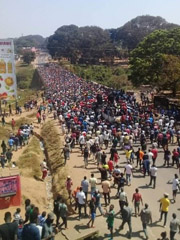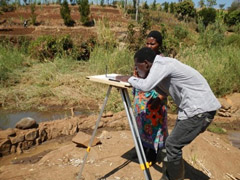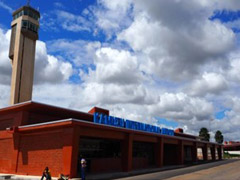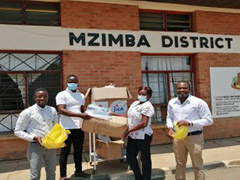A sketch of Malawi- "JICA going forward in development with a democratic friend"
2021.02.18
Malawi was named Country of the Year 2020 by the Economist magazine of the UK. Freedom House, an international NGO, reported that 80 countries showed setbacks in condition of democracy and human rights concerns amid the COVID-19 pandemic; however, the magazine praised Malawi's people for standing for freedom and democracy during the 2019 presidential election.
Shortly after a narrow margin re-elected the incumbent in the presidential election in May 2019, a constitutional court convened amid charges of election fraud claimed by the opposition parties. In February 2020, in support of the first instance court ruling, the Supreme Court nullified the election results due to irregularities in counting ballots and ordered a fresh vote. Until the court's final decision, citizens' protests spread across the country, the administration stagnated, and public safety was affected. During the re-run elections Dr Lazarous Chakwera was elected president with a 58.5% majority in June 2020 after a densely gathered election campaign across the country. This run-off was the first case in Africa in which an opposition party won an upsetting victory. Reporting of this event in a small country was worldwide.
Looking at economic situation, Malawi remains one of the poorest countries in terms of development. Its GNI per capita is US$380, more than 40% of people require 30 minutes or more to get portable water, the rate of road pavement is under 30%, and the national electrification rate is less than 15% which is far below compared to that of sub-sahara's average. Many people depend on rainfed agriculture, and tobacco farming is the primary source of foreign currency. In recent years, the population has kept growing at a rate of about 3%. As the COVID-19 pandemic increases the national finance faces more challenges as development issues are piling up.
Among various development issues, JICA has been working together with the government of Malawi mainly in three pillars of cooperation, that is, agriculture, human resources development and infrastructure development. Illustrating some of examples, in agriculture sector, together with Ministry of Agriculture, JICA is working on the Project for Market-Oriented Smallholder Horticulture Empowerment and Promotion (MA-SHEP) which aims at promoting market-oriented agriculture for increasing income of smallholder farmers and improving economic self-reliance. In addition, technical cooperation has been implemented in the field of development of medium-scale irrigation schemes by local people together with irrigation engineers aiming at breaking away from rainfed agriculture. In human resources development, more than 3,500 Malawian officials as of March 2020, mainly government personnel, have been provided opportunities to participate in training programs in Japan and third countries for enhancing capacity in various sectors. In infrastructure development, civil aviation sector, the Kamuzu International Airport (KIA) which opened in early 1980s was constructed under Japanese Yen Loan scheme and since then, rehabilitation of buildings and replacement of radar navigation systems have been undertaken. Furthermore, Capacity Development Project for Radar Air Navigation Services at KIA was implemented to ensure safety of air traffic operation. In road sector, Masauko Chipembere Highway in Blantyre was expanded to dual carriage and some crucial bridges were constructed in Mangochi, South Rukulu River in Rumphi and Balaka. Whilst in energy sector, expansion of the Tedzani Hydropower Station is underway for enhancing stable power supply for domestic use as well as industrial use.
This year marks the 50th anniversary of the deployment of the Japan Overseas Cooperation Volunteers started in 1971. Cumulatively, more than 1,800 volunteers have been working together with Malawians since then. Engraved in many places in Malawi's development is the history of its partnership with Japan. We feel that Malawi and Japan have a bond based on trust.
The people of Malawi now have high expectations for the new government, born with significant support. It is people's desire that the country say goodbye to nepotism and the corruption of the past and promote equitable development. The government leader is calling for changing the authoritarian nature and donor-dependent mindset. In addition, the new administration is making much efforts to create better diplomatic relations with other countries. The country has a new vision called, the Malawi 2063 (MW2063), pursues wealth creation and self-reliance. Malawi has an advantage in its foundation, namely peace and democracy. For promoting development of the nation, peace and democracy are fundamental assets for attracting investment. It is now a challenge that how the country maximise the existing value of the assets to accelerate fair development.
As Malawi's development partner that shares the values of freedom and democracy with Japan, we will continue to work together with an African friend, sharing Japan's development experience and supporting the fostering of the spirit of self-help. In an era of SDGs and efforts to create a sustainable society around the world, JICA hopes both Malawi and Japan are going to cooperate with each other to solve development issues in both countries and build a better tomorrow together.
(Yoshikazu Wada, JICA Malawi Office)

demonstration

Presidential Inauguration Ceremony

cooperation scene (agriculture/MIDP)

cooperation scene (infrastructure/KIA)

cooperation scene (health/COVID19 support)
scroll